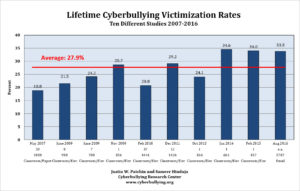
By Morgan Rihn
Odds are your child will become part of a cyberbullying scheme at some point in their young life. It’s unfortunately just one of the consequences of the new “digital age”. The only question that is relevant is: will they be on the giving end or the receiving end?
(I’ll admit for the moment there may be a few in the middle just “watching”.)
So what is cyberbullying?
By definition it is bullying that takes place over the internet, cellphones, or social media. Yes, these things overlap. Social media is on their phone, etc… Cyberbullying is posting or sending inappropriate, negative, or private information about someone to threaten, harass, or embarrass them.
My personal story about cyberbullying
I was in middle school and a new girl moved to my school. That girl and I were similar in ways and I became envious of her. I accused her of stealing my friends. Of course, I now realize my friends liked her because she was just like me. I can now confess we both did our share of cyberbullying each other. Usually on social media or via text message. A lot of hurtful things were said, and because of it, we both lost some friends. We did not get along for quite a while and we did get in trouble with our parents for the way we were acting.
Looking back on the situation, it was ridiculous. None of those things needed to be said/written, and all of those things are still out there – in/on the internet somewhere.
Of course, we eventually got over it and became good friends. Nobody changes as much as a teenager.
So isn’t it ironic that the ever-permanent internet is where today’s teens spend so much of their time? Teens need to change. The internet is permanent. Not really a good match.
What should you be concerned about? Everything…
Anything your kid posts on the internet can become public and it might affect online reputation. Don’t believe them when they say “it will disappear in a few seconds on Snapchat”. (Read our blog post about Snapchat to learn more.)
Stopbullying.gov says cyberbullying is persistent, permanent and hard to notice. Dr. Lauber told us a story about when he left school, he was safe from bullying as a young kid. But his kids experienced even in his house because they were online. There’s no longer any safe place!
Did you know…
- the 2015 School Crime Supplement (National Center for Education Statistics and Bureau of Justice Statistics) indicates that, nationwide, about 21% of students ages 12-18 experience bullying?
- the 2017 Youth Risk Behavior Surveillance System (Centers for Disease Control and Prevention) indicates an estimated 14.9% of high school students were electronically bullied in the 12 months prior to the survey?
Cyberbullying is not always easy to catch. Unless your child shows or tells you, or you’re very knowledgeable on their social life (texting, social media, etc…), you may be unaware of what is going on. Parents and children use technology differently. This makes it difficult to know when cyberbullying may be happening. Below is a graph from cyberbullying.org on cyberbullying victimization, along with some signs of cyberbullying and some helpful tips.

Is your child bullying or being bullied?
Cyberbullying happens to children of all ages at least once in their lives and at any time of any day. KidsHealth.org mentions some signs of cyberbullying:
- being emotionally upset during or after using the internet or the phone
- being very secretive or protective of one’s digital life
- avoiding school or group gatherings
- changes in mood, behavior, sleep or appetite
- wanting to stop using the computer or cellphone
- being nervous or jumpy when getting an instant message, text, or email
- avoiding discussions about computer or cellphone activities
So what can you do? I confess, I’m not a parent yet. And maybe my generation will be more prepared for it, since we’re the first generation to live through it. But here’s what I found (and Dr. Lauber endorses these tips!)
- Be open and honest with your child. Be someone they can come to for help.
- Offer your comfort and support.
- Praise them if they seek your help.
- Talk to someone like a principle or guidance counselor at their school.
- Encourage your child to “be the better person” and not retaliate.
- Keep evidence.
- Provide punishment for those who are bullying.
- Limit technology time and monitor it.
- Learn more about online safety.
- Set a good example yourself.
No one wants their child to be bullied or to bully others, but it happens. I believe it always has and always will. But I hope I’m wrong.
All you can do is try your best and help your child make good choices. The good news is I lived through it. Your child will to.
But start the conversation!
Some useful resources:
https://www.stopbullying.gov/cyberbullying/what-is-it/index.html
https://kidshealth.org/en/parents/cyberbullying.html
See our blog post on family dinners.

